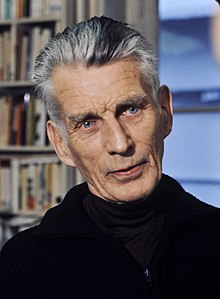1969 Nobel Prize in Literature

The 1969 Nobel Prize in Literature was awarded to the Irish author Samuel Beckett "for his writing, which - in new forms for the novel and drama - in the destitution of modern man acquires its elevation."[1]
Laureate[]
Samuel Beckett wrote novels, plays, short stories and essays. In his most famous work Waiting for Godot he examines the basic foundations of human life with strikingly dark humour.[2]
Prize decision[]
The decision to award Samuel Beckett was controversial within the Swedish Academy. While some members of the Nobel committee was enthusiastic about the idea of awarding Beckett, the Nobel committee chairman Anders Österling had serious doubts that Beckett's writing was in the spirit of Alfred Nobel's will. In 1964 he had argued that he “would almost consider a Nobel prize for him as an absurdity in his own style”. Beckett was a leading candidate for the 1968 prize along with André Malraux, W.H. Auden and the Japanese writer Yasunari Kawabata, but was rejected in favour of Kawabata.[3]
Despite Österling's reservations Beckett was awarded in 1969. The Nobel committee had received five nominations for Beckett that year, but was split as Österling and one other member supported a prize to André Malraux. Other nominations that year included Simone de Beauvoir, Jorge Luis Borges, Pablo Neruda and Graham Greene. While Österling acknowledged the possibility that behind Beckett's “depressing motives” might lie a “secret defence of humanity”, he argued that in the eyes of most readers it “remains an artistically staged ghost poetry, characterised by a bottomless contempt for the human condition”. Beckett's main supporter on the committee, Karl Ragnar Gierow, on the other hand, argued that Beckett's “black vision” was “not the expression of animosity and nihilism” but “portrays humanity as we have all seen it, at the moment of its most severe violation”, and searches for the depths of degradation because even there, “there is the possibility of rehabilitation”. Beckett was awarded and in his award ceremony speech Gierow expanded on his arguments, saying Beckett's work goes “to the depths” because “it is only there that pessimistic thought and poetry can work their miracles".[4]
Reactions[]
While not rejecting the prize, Beckett did not attend the prize ceremony, nor did he deliver a Nobel lecture.[5] His wife described his reaction to the news that he had been awarded the Nobel Prize in Literature as a "catastrophe". He quickly donated the prize money, much of it to Trinity College, Dublin.[6]
References[]
- ^ The Nobel Prize in Literature 1969 nobelprize.org
- ^ Samuel Beckett nobelprize.org
- ^ Alison Flood Samuel Beckett rejected as unsuitable for the Nobel prize in 1968 The Guardian 10 January 2018
- ^ Alison Flood 'Ghost poetry': fight over Samuel Beckett's Nobel win revealed in archives The Guardian 17 January 2020
- ^ Samuel Beckett - Nobel Lecture nobelprize.org
- ^ The Nobel and the ignoble (Part 1) The Irish Times 5 December 1998
External links[]
- Ceremony speech by Karl Ragnar Gierow nobelprize.org
- Nobel Prize in Literature
- Samuel Beckett